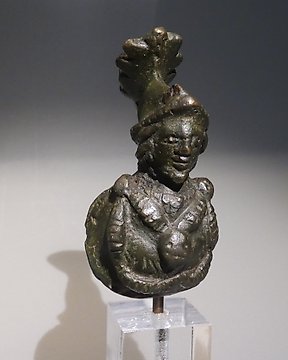
Roma Antiga Bronze Minerva - Busto da Deusa Atena. 12,5 cm H. Século I - II DC.
N.º 84066569

N.º 84066569

A bronze mount of the Ordos culture modelled in the shape of a standing animal, probably a horse. The bodily depiction of the horse is largely naturalistic, showing its head facing downwards as if grazing. The surface of the mount is convex. To the reverse, there are two mounting lugs attached cross the middle section of the horse’s torso. The surface is covered with an attractive patination with some earthly encrustation on the reverse.
The nomadic Ordos civilization and culture occupied the region of modern Mongolia and China, from the 6th century BC until the 2nd century BC. Although being in direct contact with the Chinese Han Dynasty, the Ordos culture was more influenced by the Scythian peoples of the Steppes. The Ordos civilization is primarily known for its craftsmanship in working metals and bronzes. Bronzes such as belt plaques, horse gears and weapons were decorated and modelled inspired by the natural and animal world. Scenes of animals in combat are linked with the ancient Near Eastern art traditions.
Measurements: L 8.6 cm x W 4.5 cm
Provenance: Acquired 1980-2015, Ex Abelita family collection
Como comprar na Catawiki
1. Descubra algo especial
2. Faça a licitação vencedora
3. Faça um pagamento seguro